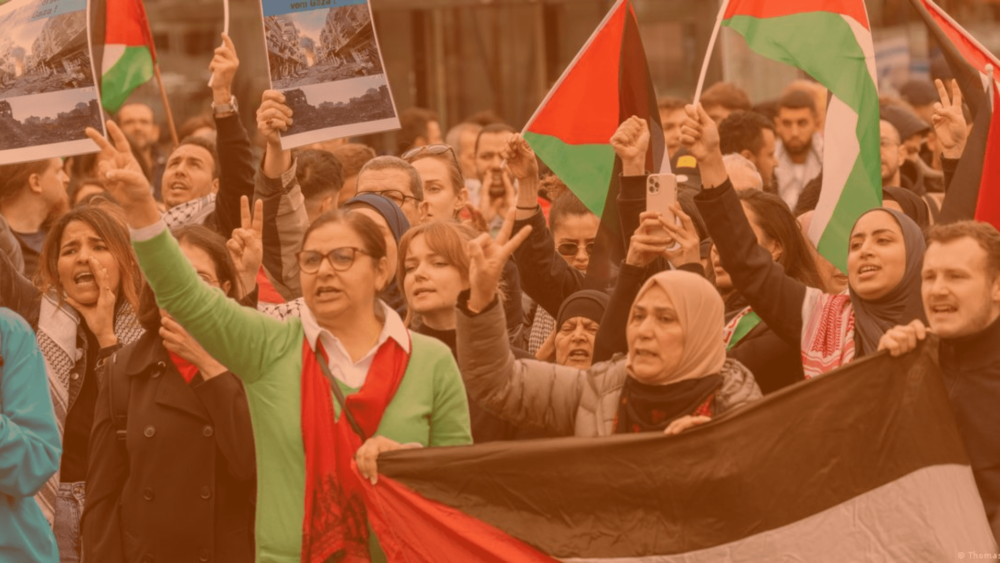On International Women’s Day, Yasemin Acar provides an impassioned first-hand account of the struggles faced by female migrant-background activists in Germany
Advocating for Palestine in Berlin as an activist has been incredibly challenging, especially with a migrant background. Having faced numerous threats, predominantly from white men, and having been physically attacked multiple times, whether while giving speeches or simply standing in the crowd, the situation is beyond difficult.
The threats extend to social media, where I’ve been targeted repeatedly. An Israeli man who threatened me with sexual violence in front of police officers, required nearly two hours of discussion to convince those officers to take seriously my desire to press charges. The ordeal doesn’t end there. German journalists launched a hate campaign against me resembling a witch hunt, and law enforcement officers targeted me, subjecting me to physical assault.
German men have spat on me, verbally assaulted, and been even laughed at by police officers. Every time I made these officers aware of their unjust behaviour, their male colleagues stood behind them, creating a sense of being ganged up on, leaving me feeling unsafe. There’s a disturbing amount of hate and anger directed at us women in this movement, driven by the perception among these men that they are physically superior.
Being a woman always presents challenges, but amplifying the voices of Palestinians has shown me that the German government doesn’t take our security concerns seriously, instead subjecting us to more danger.
Brutal law enforcement tactics
Too often, perpetrators are protected by their peers, while women are blamed or accused of being too loud, aggressive, or hysterical. These gaslighting tactics are unacceptable and endanger an entire nation. In Germany, women are often at the forefront of the Palestine movement, but this challenges the status quo, especially as Muslim women and women of colour have historically faced discrimination. Now, as people start listening to these women in the movement, authorities seek ways to silence us through brutal law enforcement tactics.
Law enforcement officers forcefully remove us from demonstrations, citing that we are ‘known suspects’. These words are used as though we are actual criminals, when in reality, everything we are accused of was in defence of human rights. We have not resisted any officer, yet we are charged with resisting, which gives the impression that they are covering their actions when we are injured by these officers, only for them to later claim that their violent actions were justified.
Instead of passively waiting for conflicts to end, waiting for others to intervene, or hoping for supportive laws, we women autonomously take the initiative. On multiple occasions, I have taken such actions, notably during the conflicts in Syria and Ukraine. What struck me the most was the shift in perception: those who now vilify me once lauded me when I advocated for Ukraine. Specifically, I refer to the Berlin Senate and law enforcement, as my activism necessitated close collaboration with these institutions. The same media channels now publishing distorted articles have previously depicted me as a model of successful integration for a woman with a migrant background.
This is deeply troubling for every woman fighting for human rights in Palestine. We shouldn’t have to cover our faces when going out at night due to fear of harassment by the police or other governmental entities. These tactics are unjust and don’t reflect the democracy Germany pretends to have and I am often wondering where white feminists are when these things happen to us.
Palestinian women continue to endure violence, threats, intimidation, movement restrictions, and discrimination from Israeli forces and men on a daily basis. Many experts have raised alarms over the arbitrary detention of numerous Palestinian women and girls by Israel, highlighting their dire conditions in custody. Reports indicate they face inhumane treatment, denial of basic necessities like menstrual pads, food, and medicine, and are subjected to severe beatings. Over 50,000 pregnant women in Gaza of whom 183 are expected to give birth daily face the biggest threat to their own lives and the lives of their offspring. It’s evident that Palestinian women bear a heavy burden, and we’re here to ensure their voices are heard, especially in a country that claims to uphold democratic values and prioritize the protection of women.
The struggle must go on
I refuse to be a pawn in a society that cherry-picks democracy and women’s rights for its convenience and therefore will continue amplifying the voices of our sisters despite the threats posed by certain men towards women on the front lines, as well as the government’s repressive measures. It is crucial to recognise that the right to freedom of speech should be exercised without resorting to violence. Utilising the democracy we live in should never be subjected to scrutiny or criminalisation, particularly for those advocating for justice in Palestine. Amidst the ongoing genocide, we are actively calling for a ceasefire, and we refuse to allow our tax money to be used for weapons sent to Israel, resulting in the loss of human lives.
Do you want to be informed of DiEM25's actions? Sign up here















